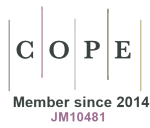Empowerment and enablement and their associations with change in health‑related quality of life after a supported osteoarthritis self‑management programme – a prospective observational study
DOI:
https://doi.org/10.1186/s40945-023-00172-7Keywords:
Physiotherapist, Patient education, Osteoarthritis, Quality of life, Empowerment, Primary health careAbstract
Background Osteoarthritis is a leading cause of disability worldwide. Current treatment supports coping strategies to improve health-related quality of life (HRQoL). The need to predict response to treatment has been raised to personalise care. This study aims to examine change in HRQoL from baseline to three and nine months follow-up after participating in a Supported Osteoarthritis Self-Management Programme (SOASP) and to examine if empowerment and/or enablement were associated with change in HRQoL after a SOASP. Methods Patients participating in a SOASP were recruited consecutively between April 2016 and June 2018. The EQ-5D was used to measure HRQoL, the Swedish Rheumatic Disease Empowerment Scale (SWE-RES-23) (score range 1–5) to measure empowerment and the Patient Enablement Instrument (PEI) (score range 0–12) to measure enablement. The instruments were answered before (EQ-5D, SWE-RES-23) and after (EQ-5D, SWE-RES-23, PEI) the SOASP. A patient partner was involved in the research process to enhance the patient perspective. Changes in outcome were examined with paired sample t-test and standardized effect sizes (Cohen´s d). Multiple linear regression analysis was performed to assess potential associations. Results One hundred forty-three patients participated in baseline measurement. Mean EQ-5D-5 L index score increased significantly from baseline to three months corresponding to a standardised effect size (Cohen´s d) of d = 0.43, 95% CI [0.24, 0.63] (n = 109), and from baseline to nine months d = 0.19, 95% CI [0.01, 0.37] (n = 119). The average EQ VAS score increased significantly from baseline to three months corresponding to a standardised effect size of d = 0.26, 95% CI [0.07, 0.45] (n = 109), and from baseline to nine months d = 0.18, 95% CI [0.00, 0.36] (n = 119). Neither SWE-RES-23 nor PEI at three months follow-up nor the change in the SWE-RES-23 score from baseline to three months follow-up were associated with change in either EQ-5D-5 L index (p > 0.05) or the EQ VAS (p > 0.05). Conclusions Health-related quality of life increased after participating in a SOASP. Empowerment and enablement as measured with the SWE-RES-23 and the PEI were not associated with change in HRQoL among patients participating in a SOASP.Downloads
Download data is not yet available.
Published
2023-09-22
How to Cite
Åkesson, K. S., Sunden, A., Stigmar, K., Eek, F., Pawlikowska, T., & Hansson, E. E. (2023). Empowerment and enablement and their associations with change in health‑related quality of life after a supported osteoarthritis self‑management programme – a prospective observational study. Archives of Physiotherapy, 13(1). https://doi.org/10.1186/s40945-023-00172-7
Issue
Section
Research Article
License
Copyright (c) 2023 The Authors

This work is licensed under a Creative Commons Attribution-NonCommercial 4.0 International License.









